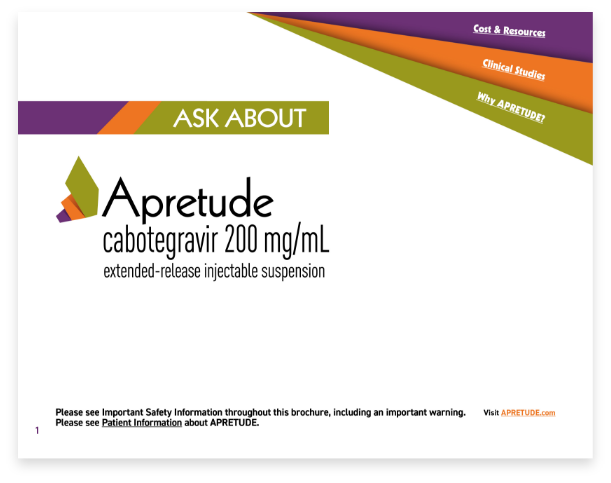
Commercial patients may be eligible for a $0 copay
* For those with coverage under the medical benefit. Insurance plans vary. Contact ViiVConnect or your healthcare provider to see what this means for you.
Source: Coverage data are provided by Managed Markets Insight & Technology, LLC, as of June 2023.
APRETUDE Savings Program
Eligible patients may pay as little as a $0 copay per injection on prescribed APRETUDE. A copay is the out-of-pocket amount you will pay based on insurance coverage. If you’re eligible, be sure to give your coupon codes to your specialty pharmacy and healthcare provider.
The amount you pay for APRETUDE will largely depend on your insurance coverage, so contact your provider, as they will know the details of your plan. Your doctor’s office, insurance provider, and ViiVConnect can help you better understand your out-of-pocket costs.
Federal law requires that insurance plans cover certain items and services associated with PrEP. Call your insurance company to see how this may impact you.
Some insurance companies may require you to go on daily oral PrEP pills first. However, if you and your healthcare provider determine that APRETUDE is a better fit for you, make sure to talk to your healthcare provider. It may be possible to work with your insurance company to switch you to APRETUDE.



Find a PrEP provider
Need help finding a healthcare provider who prescribes PrEP medication?
Find an HIV testing center
Need help finding an HIV testing center?
Find a PrEP provider
Need help finding a healthcare provider who prescribes PrEP medication?
Find an HIV testing center
Need help finding an HIV testing center?
Find a PrEP provider
Need help finding a healthcare provider who prescribes PrEP medication?
Find an HIV testing center
Need help finding an HIV testing center?

Find cost and savings info, clinical trial data, and more. Click below for a copy.

Questions about APRETUDE? Click below for more info.
Get the facts about APRETUDE.
IMPORTANT SAFETY INFORMATION
What is the most important thing I should know about APRETUDE?
Information important for people who receive APRETUDE for pre-exposure prophylaxis (PrEP) to help reduce their risk of getting human immunodeficiency virus-1 (HIV-1) infection:
Before receiving APRETUDE to reduce your risk of getting HIV-1, you must be HIV-1 negative to start APRETUDE. Do not receive APRETUDE unless you are tested and confirmed to be HIV-1 negative.
Some HIV-1 tests can miss HIV-1 infection in a person who has recently become infected. Tell your healthcare provider if you had a flu-like illness within the last month before starting or at any time while receiving APRETUDE. Symptoms of new HIV-1 infection include: tiredness; joint or muscle aches; sore throat; rash; enlarged lymph nodes in the neck or groin; fever; headache; vomiting or diarrhea; or night sweats
While you are receiving APRETUDE for HIV-1 PrEP:
APRETUDE does not prevent other sexually transmitted infections (STIs). Practice safer sex by using a latex or polyurethane condom to reduce the risk of getting STIs
You must stay HIV-1 negative to keep receiving APRETUDE for HIV-1 PrEP
Who should not receive APRETUDE?
Do not receive APRETUDE if you:
already have HIV-1 or do not know your HIV-1 status. If you are HIV-1 positive, you need to take other medicines to treat HIV-1. APRETUDE can only help reduce your risk of getting HIV-1 infection before you are infected. If you have HIV-1 and receive only APRETUDE, over time, your HIV-1 may become harder to treat
are allergic to cabotegravir
are taking certain medicines: carbamazepine; oxcarbazepine; phenobarbital; phenytoin; rifampin; or rifapentine
What are the possible side effects of APRETUDE?
APRETUDE may cause serious side effects:
Allergic reactions. Call your healthcare provider right away if you develop a rash with APRETUDE. Stop receiving APRETUDE and get medical help right away if you develop a rash with any of the following signs or symptoms: fever; generally ill feeling; tiredness; muscle or joint aches; trouble breathing; blisters or sores in mouth; blisters; redness or swelling of the eyes; swelling of the mouth, face, lips, or tongue
Liver problems. Liver problems have happened in people with or without a history of liver problems or other risk factors. Call your healthcare provider right away if you have any of the following symptoms: your skin or the white part of your eyes turns yellow; dark or “tea-colored” urine; light-colored stools; nausea or vomiting; loss of appetite; pain, aching, or tenderness on the right side of your stomach area; or itching
Depression or mood changes. Call your healthcare provider or get emergency medical help right away if you develop any of the following symptoms: feeling sad or hopeless; feeling anxious or restless; have thoughts of hurting yourself (suicide) or have tried to hurt yourself
The most common side effects of APRETUDE include:
Pain, tenderness, hardened mass or lump, swelling, bruising, redness, itching, warmth, loss of sensation at the injection site, abscess, and discoloration; diarrhea; headache; fever; tiredness; sleep problems; nausea; dizziness; passing gas; stomach pain; vomiting; muscle pain; rash; loss of appetite; drowsiness; back pain; or upper respiratory infection
These are not all the possible side effects of APRETUDE. Call your healthcare provider for medical advice about side effects
Before receiving APRETUDE, tell your healthcare provider about all your medical conditions, including if you:
have ever had a skin rash or an allergic reaction to medicines that contain cabotegravir
have or have had liver problems
have ever had mental health problems
have or ever had kidney problems
are pregnant or plan to become pregnant. It is not known if APRETUDE will harm your unborn baby. APRETUDE can remain in your body for up to 12 months or longer after the last injection. Tell your healthcare provider if you become pregnant while or after receiving APRETUDE
are breastfeeding or plan to breastfeed. APRETUDE may pass into your breast milk. Talk with your healthcare provider about the best way to feed your baby while or after receiving APRETUDE
Tell your healthcare provider about all the medicines you take, including prescription and over-the-counter medicines, vitamins, and herbal supplements.
Some medicines may interact with APRETUDE. Keep a list of your medicines and show it to your healthcare provider and pharmacist. Do not start a new medicine without telling your healthcare provider
How will I receive APRETUDE?
APRETUDE will be given to you as an injection by your healthcare provider
APRETUDE is initially given as an injection into the muscle of your buttock 1 time every month for the first 2 months, then as an injection 1 time every 2 months
Before receiving your first APRETUDE injection, your healthcare provider may have you take 1 oral cabotegravir tablet 1 time a day for 1 month (at least 28 days) to assess how well you tolerate cabotegravir
APRETUDE is a long-acting medicine and may stay in your body for 12 months or longer after your last injection
Stay under the care of a healthcare provider while receiving APRETUDE. It is important that you receive APRETUDE as scheduled
If you miss or plan to miss a scheduled injection of APRETUDE by more than 7 days, call your healthcare provider right away to discuss your PrEP options
If you stop receiving APRETUDE, talk to your healthcare provider about other options to reduce the risk of getting HIV-1 infection
You are encouraged to report negative side effects of prescription drugs to the FDA. Visit www.fda.gov/medwatch, or call 1-800-FDA-1088.
Please read the Patient Information for APRETUDE and discuss it with your healthcare provider.